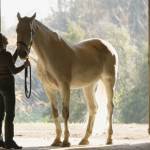Managing the Senior Horse

How old is a senior horse? The answer is different for each equine. Some horses seem old and feeble at 15; others are still going strong well into their 20s. As with human beings, many things—health history, use, care, conformation and other genetic factors—influence the condition and overall well-being of aged horses. As a general rule, horses begin to slow down somewhat by their late teen years. The occasional horse lives 30 or even 40 years, but most people would consider a horse in its mid-20s to be fairly old. Ponies often have a somewhat longer lifespan than their larger counterparts.
Comparing human and equine years is not an exact science. As a rough estimate, a 20-year-old horse is equivalent to a person in their late 50s, and a 30-year-old horse could be compared to a person in their mid-to-late 80s.
Feed management for older horses is based around several factors. As horses approach old age, their ability to digest protein, fiber, vitamins, and minerals decreases. Plenty of clean hay and a fortified feed with high-quality, easily digestible protein are recommended. Many feed companies have special product formulations based on the unique requirements of senior horses. Water and free-choice salt should always be provided.
While regular dental care is important for horses of all ages, it is especially critical for older horses. Sharp edges or hooks on teeth can cause discomfort that keeps them from eating enough to maintain a healthy condition. Very old horses may lose teeth and be unable to chew and grind their feed adequately. For these animals, owners can add water to pelleted feed, forming a mash that is more easily swallowed and digested. Water-soaked hay cubes can provide fiber to horses that have trouble chewing and swallowing hay.
No matter what ration is offered, it can’t help the horse if it’s not eaten. Older horses can be picky eaters, resisting anything new or different. Additions or changes to the diet must be made very gradually, not just to avoid putting the horse off its feed but also to allow the gut to adapt to the new type of feed or hay. Drizzling feed with molasses, Karo syrup, or flavored gelatin may tempt a picky horse to eat. Dusty or moldy feed or hay should never be offered to horses.








